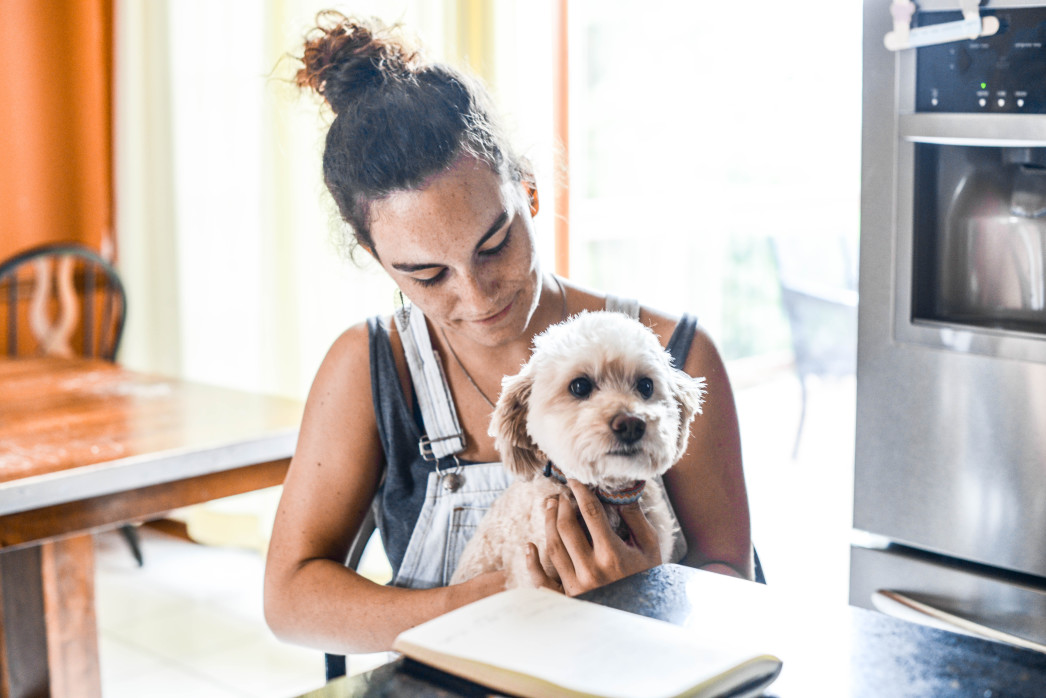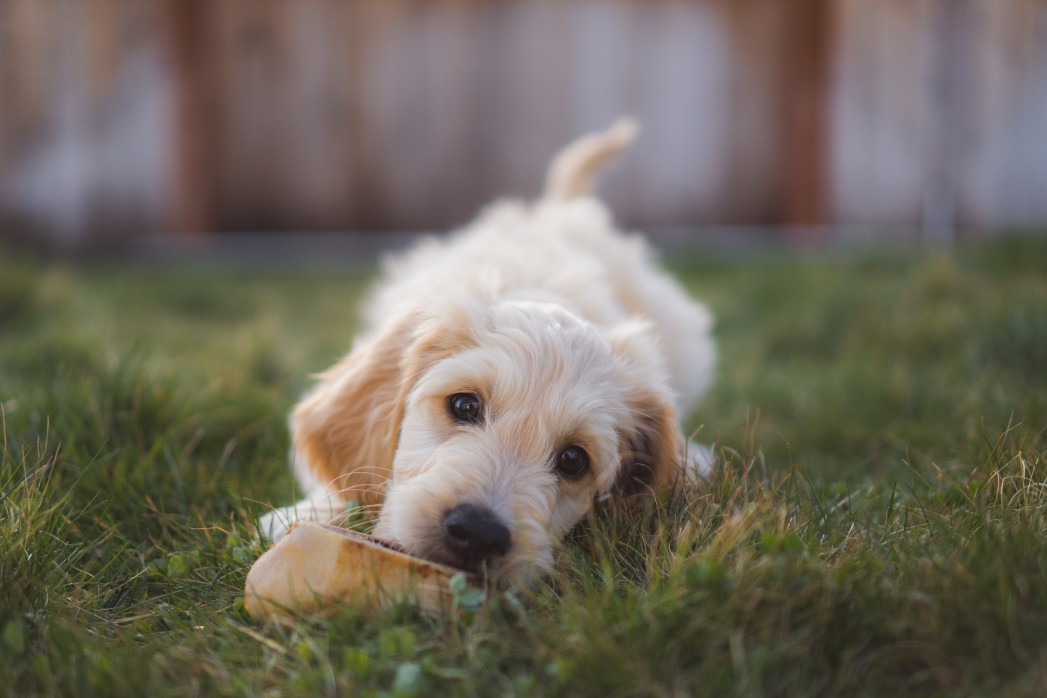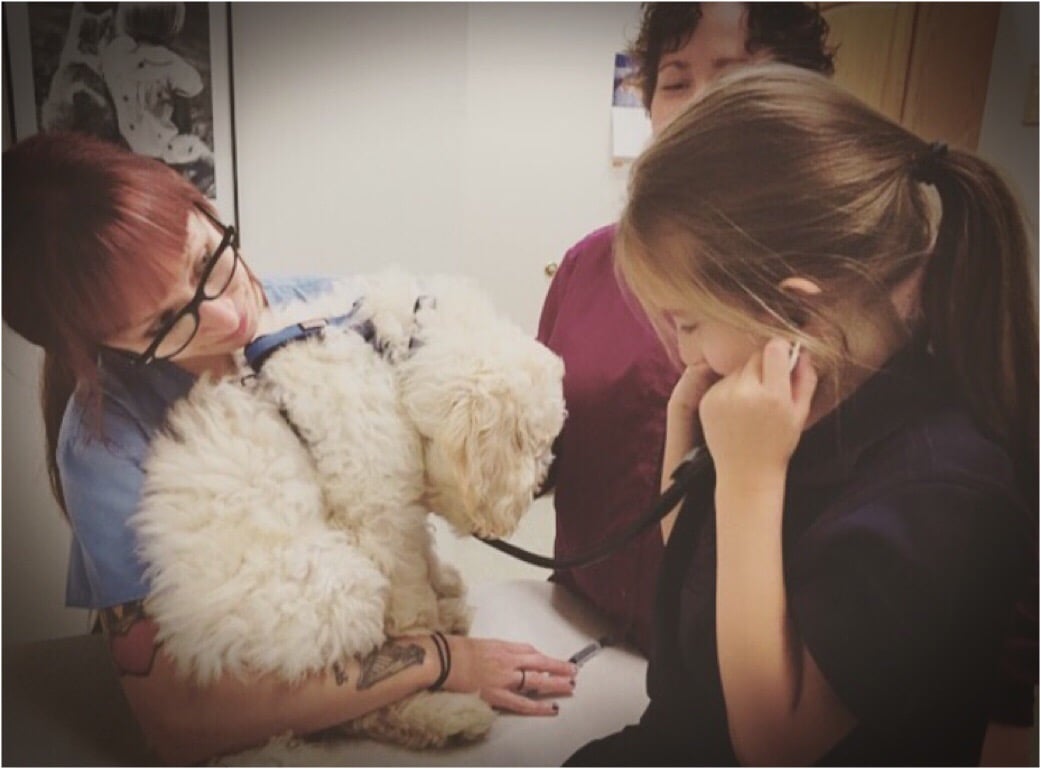What to Do About Goldendoodle Hair Loss & Bald Spots: Symptoms, Causes, and Diagnosis Suggestions (Vet Advice!)
What to Do About Goldendoodle Hair Loss & Bald Spots: Symptoms, Causes, and Diagnosis Suggestions – written by Dr. Sara Ochoa
Is your Goldendoodle losing their hair? There are many reasons that your Goldendoodle may have suddenly started losing hair, or you started noticing bald patches in your Goldendoodle’s coat. There may also be other signs of hair loss in your Goldendoodle. Most of this time, your Goldendoodle can be easily treated, and the hair grows back. This article will explain possible reasons why your Goldendoodle may be losing their hair and what you need to do about it.

What is causing my Goldendoodle to Lose their hair?
- Seasonal Shedding
- Skin Infections
- Allergies
- Dry Skin
- Fleas, Ticks, and Mites
- Hormone Imbalance
- Excessive Shedding
By seeing your vet, they can help you determine the exact cause and treatment plan. Many times, supplements can help keep your pet’s skin nice and healthy.
Most of the time, these signs can easily be treated by your vet. Sometimes a large amount of hair loss can be a sign of something more serious going on in your dog.
Signs That Your Goldendoodle Is Losing Its Hair
The signs of hair loss in your Goldendoodle can include your dog’s hair feeling brittle or dry, shedding more hair than normal, and seeing bald patches on your dog.
The patches may be circular or irregularly shaped. Your Goldendoodle’s hair loss might also be only on a specific region or generalized over your dog’s entire body.
Causes Of Goldendoodle Hair Loss
Seasonal Shedding
Sometimes what you may think is extreme hair loss is just normal shedding. Most Goldendoodles shed very little or not at all as a result of the Poodle parents’ low-shedding, hypoallergenic coats. Goldendoodle coats are made of curly hair, which sheds lightly and, when it does, remains trapped on the dog in their curls (which can quickly turn into mats if left unbrushed).
However, they also have a Golden Retriever parent, and a Golden Retriever’s coat type is long fur that sheds frequently and also requires frequent brushing. The genetics of your Goldendoodle will be unique since they are a crossbred hybrid dog who may inherit traits randomly from their Poodle or Golden Retriever parent.
Your Goldendoodle loses their fur when the individual hairs become old or damaged, but they can also lose a little more hair seasonally when the weather turns warm.

Most dogs will shed year-round. Some dog breeds, such as huskies and labradors, will grow very thick winter undercoats that they must shed in the spring.
Seasonal shedding does not happen as much if you live in a moderate climate. If your dog’s shedding is out of control, brushing your Goldendoodle a couple of extra times a week can remove extra hair.
Bacterial and Fungal Skin Infections
Bacteria and yeast are normal inhabitants of your Goldendoodle’s skin.
Sometimes they can get out of control and cause a skin infection in your Goldendoodle. Bacterial, fungal, or yeast infections on your Goldendoodle’s skin may cause hair loss, redness, itching, and odor.
Sometimes, these bacterial infections can cause pimple-like pustules.
Goldendoodles can also get ringworm. This is a fungus that can cause hair loss and small areas of infection. Even though it has a worm in its name, it is not actually a worm.
Ringworm can cause red, itchy, or scaly patches that you can also catch. Your vet will fully examine your Goldendoodle, recommend some testing and prescribe antibiotics or antifungals to treat their infection if needed.
Allergies
Some Goldendoodles can have allergies to certain things such as food, grass, mold, and pollen. These will cause your Goldendoodle to be very itchy and lose hair.
You may even notice that your Goldendoodle’s skin red or has a foul odder. Many times, these allergies can be treated with an antihistamine such as Benadryl.
If the allergies have caused your dog to itch, they can also have a secondary skin infection that will need your vet to prescribe your dog antibiotics.
Dry Skin
Your Goldendoodle may be having hair loss because they have very dry skin. Many things can make your dog have dry skin, such as the weather.
When it is dry outside, your dog may also suffer from dry skin. Your Goldendoodle may not be getting the correct amount of fatty acids in their diet.

You can add fatty acids to your Goldendoodle’s diet to help with their dry and flaky skin. Even using a conditioning shampoo, you will notice that your Goldendoodle’s hair is nice and shiny.
Fleas and Ticks
Some parasites can cause your Goldendoodle to be very itchy and lose hair. Common parasites that can be seen on your Goldendoodle are fleas and ticks. Some Goldendoodles can be very allergic to these parasites, and just one can cause them to be extremely itchy and have hair loss.
Your vet can help you diagnose a parasite infection in your Goldendoodle and get you the correct medication to get rid of these unwanted parasites.
Mites
Mites such as Demodex or Mange can cause your Goldendoodle to lose hair and be very itchy.
These mites are microscopic parasites that can bury deep into your Goldendoodle’s hair follicles, causing them to be very hard to treat. Your veterinarian will take a very small scraping of your dog’s skin and look at it under the microscope to find these little mites.
If your dog does have mites, there are certain medications that your vet can prescribe to your Goldendoodle to help kill these mites. Some of these mites can even be transferred from your Goldendoodle to you
Hormone imbalance
Hormone imbalances such as hypothyroidism, adrenal gland disorders, or growth hormone disorders can all cause your Goldendoodle to lose their hair. Some Goldendoodles can lose a little bit of hair after they are neutered because there is a decrease in testosterone.
Other diseases such as liver disease, kidney disease, and cancer can all cause unexplained hair loss in your Goldendoodle. If your Goldendoodle has just suddenly started to lose their hair, it is best to take them to your vet.
Your vet may suspect an internal problem as a cause for your Goldendoodle’s hair loss. They will recommend bloodwork and probably X-ray or ultrasound imaging to find out the cause.
Excessive shedding
Other things can cause excessive shedding in your Goldendoodle.
These are stress, poor nutrition, pregnancy, lactation, or any other underlying medical condition.
If you think your Goldendoodle is shedding more than normal or if they are developing bald spots, make an appointment with your vet.

The hair loss treatment that they prescribe for your Goldendoodle will depend on what is causing this hair loss and any other health problems that your dog may have.
Nutritional Deficiency
Hair loss in Goldendoodles can also occur due to a nutritional deficiency. The food that your dog eats will determine the healthy development of your Goldendoodle’s skin and fur.
Keratin is the core component of hair. Your Goldendoodle’s hair needs amino acids to be synthesized properly.
Without these amino acids, your Goldendoodle may have slow hair growth. Their hair may be brittle, and eventually, they will suffer from hair loss. Also, biotin is a key nutrient in supporting healthy skin and hair and protecting against hair loss.
How to Treat Goldendoodle Hair Loss
There are many different treatments for hair loss in Goldendoodles. The treatment will all depend on what is causing your Goldendoodle to lose their hair.
These are common treatments that your vet may prescribe:
- Allergy medications: If your dog has seasonal allergies, certain medications such as Benadryl or Apoquel may be used. These medications will help decrease the allergic response in your Goldendoodle.
- Flea and Tick prevention: If your Goldendoodle has fleas or ticks, your vet will recommend that they are started on flea and tick prevention.
- Omega Fatty Acid Supplements: Omega 3 fatty acids are great at helping repair the skin barrier. These supplements can be given daily to help with itching. These supplements are great to help make the skin and fur healthy and shiny.
- CBD oil: CBD or cannabidiol is a great supplement to give to pets with skin problems. This has been shown to help repair the natural skin barrier. If your dog is itching and causing damage to the skin, CBD oil can also help with the pain caused `by your pet itching themselves.
- Change their Diet: Goldendoodle can be allergic to their food, making the itch and lose hair. Your Goldendoodle would need a special diet to help with their itching. Usually, they will need to switch to a protein that they do not commonly eat, such as rabbit, venison, or duck. Many of these foods have very few ingredients.
- Medicated Shampoos: If your dog has a skin infection causing them to lose hair, your Goldendoodle may need a special shampoo. Some shampoo has antifungals and antibiotics in them to help treat your Goldendoodle’s skin infection.
By working with your veterinarian, you can figure out what is causing your Goldendoodle to lose their hair.
Sometimes this can be a very easy fix, and others it can be a lifelong battle of supplements that your Goldendoodle will need.

Goldendoodle Hair Loss Is Treatable!
Hair loss in your Goldendoodle can be very frustrating. Many times, this is due to an underlying problem that can easily be fixed, and your Goldendoodle’s fur will quickly grow back.
If you notice that your Goldendoodle has a bald spot or is losing hair all over their body, take your Goldendoodle to your vet.
Make sure that you are feeding your Goldendoodle good quality food to keep their hair healthy and shiny.


